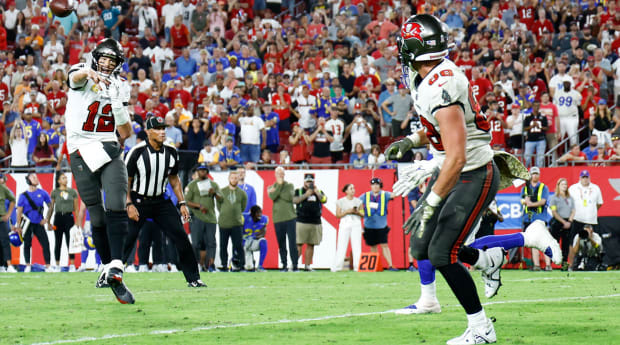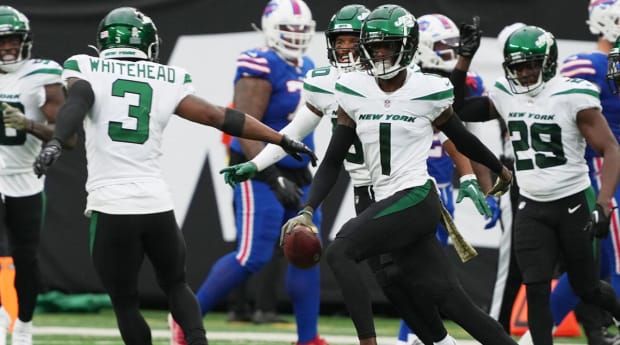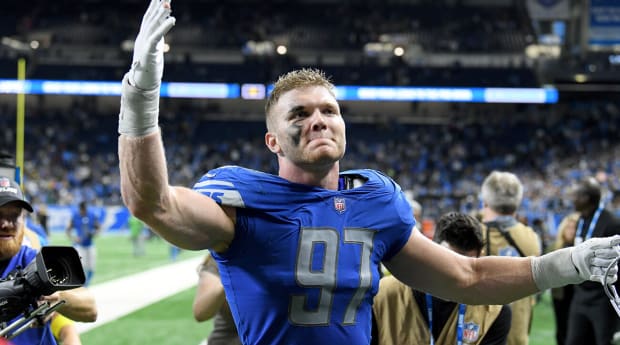More MMQB: Kirk Cousins Was Not Out for Revenge | NFL Midseason: One Wish For Every Team | Ten Takeaways: Tyreek Hill Is Finally a ‘True No. 1 Receiver’ in Miami | Six From Saturday: NFL Scouts Weigh in on Georgia Defensive Prospects
Cade Otton was born April 15, 1999, when Tom Brady was in spring ball ahead of his fifth year at Michigan. He turned six years old two months after Brady won his third Super Bowl. By the time he graduated high school, Brady already had five rings.
So the first thing I asked Otton—when I got him on the phone Sunday night after he caught the game-winning touchdown pass from Brady against the Rams—was whether he had a sort of Where the hell am I? moment in the hour before we talked.
“That’s hilarious that you mention that—I think the kinda ooh and aah I had was at the beginning when I first got here,” the 23-year-old said. “But after spending time with him and working with him, he’s just a great teammate and a great player who really invests in his teammates. And so I felt like that whole last drive, we’d been there before and I think everyone felt confident that we were gonna be able to get it done despite the results of the past few weeks.

Douglas DeFelice/USA TODAY Sports
“But, yeah, taking a step back and adding some perspective, it’s like, Holy cow, I can’t believe that just happened.”
And here’s what I take from it—what we saw from Brady early on Sunday night was the one quality that won’t age out, rough as the rest may have looked at points the past two months. It was proved over and over Sunday with the throws he made, the calm he exuded and the confidence he projected onto a rookie such as Otton, who had every reason to be tense and tight, and wasn’t because of Brady.
In case you missed it, and I’m sure you didn’t, here was the situation: The Buccaneers got the ball back at their own 40-yard line with 44 seconds left and no timeouts. They dropped a couple of potential game-tying touchdowns on the previous drive and settled for a field goal, which cut the deficit to 13–9. The past two Super Bowl champions, Tampa Bay and the Rams (3–5 and 3–4 heading into the game, respectively), needed this one, and the Buccaneers got the stop they needed after kicking the field goal to keep their faint hopes alive.
Or those would be faint—if the quarterback wasn’t still Thomas Edward Patrick Brady Jr.
Otton, for his part, had to grow up fast, as Brady delivered a very direct message to the players in the huddle—“It’s time. We gotta do it now.” And right away, the ball was going to the rookie who’s emerged at tight end with Rob Gronkowski gone and Cam Brate beat up, and whom the quarterback was ready to roll with on a drive in which plays couldn’t be wasted because they had no timeouts.
“I just ran a seam route, and, thankfully, the middle was open,” Otton said of his 28-yard reception, which gave the Buccaneers a first down at the Rams’ 32 with 28 seconds left. “Tom delivered a great ball, and when we’re in two-minute mode, we know we gotta get the ball to the ref as fast as we can and get up and get ready. So everyone was ready to do that, executed and it was really good to get a good drive start. We all just want to get in a rhythm, start of no-huddle drives, and we were able to do that.”
Watch Tampa Bay games live with fuboTV: Start a free trial today.
Next, Brady threw a swing route to Leonard Fournette, who ran out of bounds with a four-yard gain to stop the clock at 24 seconds. Brady then got Scotty Miller matched up on Rams rookie Derion Kendrick and got him the ball on an out-breaking route for 14 yards. Brady used Miller again on the next snap to take advantage of a Rams secondary playing way off the ball for another seven yards. Miller easily got out of bounds on both, and that left 16 seconds.
From there, Mike Evans drew pass interference in the end zone, moving the ball to the 1 to set up Otton for his game winner. And, yup, he wound up paying off Brady’s trust.
“First of all, we needed to sell run—we’re at the one-yard line, so we knew they would at least respect the run up the middle,” Otton said. “And then the receivers outside of me did a great job getting me open, just kinda creating a pile in the box. And I was able to slip out to the flat while running back and O-line sold run, too, and Tom delivered the ball perfectly. We had worked on that play a lot.”
It looked like it in the way that Otton sprung free and walked into the end zone untouched.
It also felt like it to the guys executing the play. Really, the whole drive did.
“Honestly, it felt like practice,” Otton said. “We practiced that situation many times, and we knew our job and it felt like we’d been there before and we just had to go do what we’ve done a bunch of times. Tom’s a big part of that, obviously. I think I heard he’s had 54 game-winning drives, so yeah, obviously he knows how to get it done, and we’ve practiced it and felt like we knew how to get it done. It’s just great to get the result.”
I did correct Otton. It’s now a record 55-game-winning drives for Brady.
But you can excuse him. There are more than a few of those he couldn’t possibly remember.
And that’s what is so amazing about what he gave all of us watching on Sunday. It’s something that quite literally links generations. Brady’s first of the 55 came 21 years ago against the Chargers in San Diego. The other quarterback in that one, Doug Flutie, turned 60 years old a few weeks ago.
A lot, obviously, has changed since then.
The effect Brady has on his teammates, and games, in these situations sure hasn’t. And it’s just another thing, when he retires, to separate him from everyone else.

Chris Pedota/NorthJersey.com/USA TODAY Network
If you want proof that these are different Jets, just look at the first few minutes of Sunday’s game with the Bills at the Meadowlands.
They came into the AFC East showdown off a loss to the old-guard Patriots, a game they controlled through the first half only to have an overturned pick-six on a roughing-the-passer call, create a 10-point swing and set New England up to run away with the game in the second half. On Sunday, kickoff specialist Braden Mann looked like anything but in muffing the opening kick and giving Buffalo the ball at its own 45. And then, Josh Allen hit Stefon Diggs for 42 yards down the right sideline over rookie Sauce Gardner.
The No. 4 pick and his handling of the play will tell the rest of the story. But we can start with what actually happened.
“It was just like a three-match [zone],” Gardner told me after the game. “So on film, when he’d usually motion there, it wasn’t a deep shot like that. And I still don’t think that’s what his route was supposed to be. But they’re not a generic football team. It’s always about how you defend the second play. So that was the very first play. And I just knew, it’s just the first play, and I was telling everybody to chill out, we’re going to be good.”
Maybe the old Jets would’ve looked at what happened the week before, looked at how this one started and folded up the tent.
These Jets, full of first- and second-year building blocks blissfully unaware of the history, or intentionally defiant of it, didn’t. And maybe most impressive, Gardner would, eventually, be able to turn his own bad start into a very real positive when it mattered most.
But, first, the Jets had to get the game to the point where there would even be tense moments in the fourth quarter. That wasn’t going to be easy with Zach Wilson having been up-and-down and New York falling behind 14–3 midway through the second quarter with the bad taste of New England lingering.
“The adversity we go through, that’s what makes our bond even stronger,” Gardner said. “Not just the players, but the players and the coaches as well. After that loss that we feel like we shouldn’t have lost—things happen—I feel like we came together and we just believed in each other, believed in the coaches, believed in the play-calling and everything, and it was no surprise after we saw the result.
“We definitely knew that we had what it took in the locker room.”
The coaches evidently did, too, in sticking with the plan—leaning on the run game to control the number of possessions the Bills’ offense would get and wearing down a defense playing without playmaking linebacker Matt Milano. From their last touchdown of the game—scored with 6:38 left in the second quarter through the point when the Jets took the lead on a seven-yard screen pass to James Robinson with 4:10 left in the third quarter—the Bills had a grand total of 1:23 in time of possession. And the lesson Gardner learned played a part in it.
Gardner figured Allen would try, eventually, to go back to the well on him over the top, and so it was that the Bills were in second-and-17 from their own 22 right after a Von Miller strip sack of Wilson. At the snap, Gardner, sitting in an underneath zone, wanted to try to make Allen believe he was moving down to cover James Cook in the flat, knowing he’d bail out and get deep in a hurry once Allen tried to throw it over his head.
“I feel like I had a good idea of how he thinks,” Gardner said. “It just took me the first series to understand how he thinks and what throws he wants to make and what throws he really doesn’t want to make. … The receiver [Gabe Davis] had outside release on me. And a running back had sat in front of me, so I was just baiting the quarterback to try to squeeze the ball in there, in the hole, baiting him to throw that hole shot because I knew I had the length to make the play. And that’s what I did.”
Robinson's touchdown came four plays later to put the Jets up 17–14. They wouldn’t trail again—and Gardner wasn’t done making plays.
His last one, in fact, came on Buffalo’s final offensive snap in a fourth-and-21 situation with Allen in desperation mode. Gardner, on that one, had to legitimately recover after letting Davis behind him.
“They ran the seven route,” Gardner said. “I thought he was about to just throw the ball up, at the corner, at 13 on the missile route. Then I saw our D-line getting after the quarterback, so I just knew it was going to be time [for Allen] to run. And I actually didn’t know he could throw the ball that far. Like, I saw him throw some shots on film but I didn’t know exactly how far they were. I was just looking at Gabe, looking at his eyes. And it’s like, he didn’t show signs of the ball being behind him. So the quarterback, he chucked it for sure.”
But Gardner was able to get back in time, knock the ball away and get the Jets to 6–3.
And if you’ve been paying attention, you know Gardner isn’t stunned it’s going this way—that the Jets knocked off the mighty Bills, that they didn’t fold when things went awry, that the team is squarely in the playoff hunt. Which is pretty good news, as I see it, for a team trying to overcome some of the franchise’s more recent history of being a pro-football circus.
“I know we’re young, but the way that the organization treats us, the things that they expect from us doesn’t have anything to do with us being young,” Gardner said. “You’re just another player on the team and somebody that they want to contribute. They brought us here to change the culture, and I feel like that’s exactly what we’ve been doing.”
And they’ll have another chance to prove it real soon, with a rematch with the Patriots looming in two weeks (Nov. 20) after their bye.

Lon Horwedel/USA TODAY Sports
I figured Aidan Hutchinson, coming into the NFC North, didn’t think he’d intercept Aaron Rodgers before he’d sack him—“Yeah, I never thought I’d do that.”
What I didn’t know, before Sunday, was that Hutchinson had never picked off anyone, period, before taking the field for Week 9. But that’s the story I got from Hutchinson postgame, as we talked and he milled about seeing family in the bowels of Ford Field.
“My first pick!” he said. “I’ve picked [balls] off in practice. But I’ve never, ever gotten one in a game. Came close …”
So it was a shocker for the 6'7", 265-pound Hutchinson. A shocker for Rodgers. A shocker for everyone. And how it happened was wild, too.
“Just going through, [David] Bakhtiari reported eligible on that play and they came out in that unbalanced formation, and so it just kind of set up like that,” Hutchinson explained. “They were going tempo, and, man, I was just trusting my instincts and it all kind of fell into place. And I ended up getting my first pick ever in football and got to dance a little bit, too.”
Excuse him for showing off his moves. Because the play led to an even bigger shocker.
That would be Lions 15, Packers 9.
The first headline here, of course, if we move Detroit to the side for a second, would be the massive, overarching issues Rodgers and his offense are having. Rodgers had struggled before, but hadn’t had a multi-interception game yet this year coming into Sunday. In Detroit, he threw three. And where the Packers have been able to lean on the run game in such spots in the past, that didn’t happen Sunday—Rodgers himself was the Packers’ leading rusher with 40 yards on four carries.
Along the way, the operation looked as discombobulated as ever. Rodgers, like a few other all-time great quarterbacks, doesn’t like a lot of motion in his offense, so the Packers run more stagnant looks than most, to give the quarterback a clearer view of the defense. The problem is the Packers don’t have receivers who can beat man coverage in a post–Davante Adams world, and that’s a tough place to be if you’re not moving guys around.
The hope has been that rookies Christian Watson and Romeo Doubs could fill that void, but it hasn’t happened yet, and now Doubs is hurt. Worse, the Packers (3–6) are starting to run out of time, and the Vikings (7–1) sit four and a half games ahead of them in the NFC North.
All that said, the Lions (2–6) surely would tell you that their previously struggling defense had a little something to do with the Packers’ implosion, and that the three picks, all of which were registered by rookies (Hutchinson, two from Kerby Joseph), came at critical points in the game to give that unit something to hang its hat on.
But if you really want the root of the turnaround, as Hutchinson sees it, it happened during the week. Coming out of last week’s loss to Miami in which Detroit blew a 27–17 lead and allowed 476 total yards, Dan Campbell fired defensive pass-game coordinator Aubrey Pleasant, something that sure got the attention of the players. The Lions had allowed more than 350 yards in six of seven games, more than 400 yards in three of seven and more than 500 yards once. Every team they’d faced had scored at least 24 points on them, with three going over 30. Until Sunday against the Packers.
“It just reminds you that the NFL is a business,” Hutchinson said of Pleasant’s firing. “And if you’re not winning ball games, they’re going to make changes. We’re all very aware of that.”
Aware enough that the vets on that side of the ball decided to take matters into their own hands.
“Earlier in the week, we came together as a defense, players only,” Hutchinson continued. “And we were kind of just talking things out and getting real with each other and what we thought. And I thought that really realigned us amidst all the chaos that was kind of going on throughout the week with some of the trades and the coach getting fired. So I thought we came together, man, and we got the stops we needed today.”
The biggest stop came at game’s end with Rodgers missing on four consecutive throws after getting to first-and-10 at the Lions’ 17 to give Detroit its first win since Sept. 18. And the hope is that this week’s changes, and stops like that one against the Packers, can help the defense turn the corner the way the offense did last year, when Ben Johnson ascended into a coordinator role on that side of the ball.
After the way they started the year, there’s really only one way to go anyway. Something that, inexplicably, Rodgers can attest to right now.







